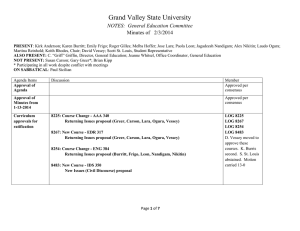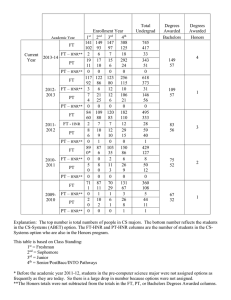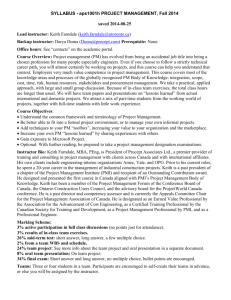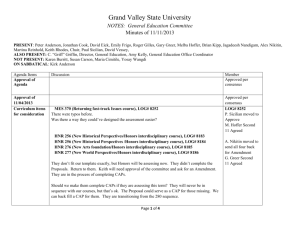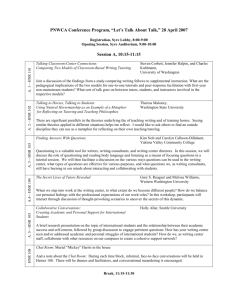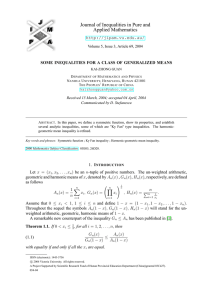NOTES: General Education Committee
advertisement
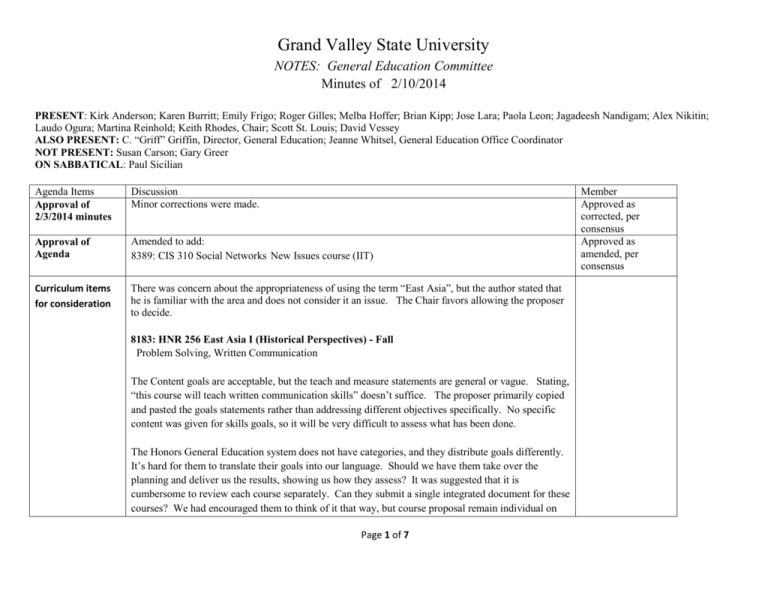
Grand Valley State University NOTES: General Education Committee Minutes of 2/10/2014 PRESENT: Kirk Anderson; Karen Burritt; Emily Frigo; Roger Gilles; Melba Hoffer; Brian Kipp; Jose Lara; Paola Leon; Jagadeesh Nandigam; Alex Nikitin; Laudo Ogura; Martina Reinhold; Keith Rhodes, Chair; Scott St. Louis; David Vessey ALSO PRESENT: C. “Griff” Griffin, Director, General Education; Jeanne Whitsel, General Education Office Coordinator NOT PRESENT: Susan Carson; Gary Greer ON SABBATICAL: Paul Sicilian Agenda Items Approval of 2/3/2014 minutes Discussion Minor corrections were made. Approval of Agenda Amended to add: 8389: CIS 310 Social Networks New Issues course (IIT) Curriculum items for consideration There was concern about the appropriateness of using the term “East Asia”, but the author stated that he is familiar with the area and does not consider it an issue. The Chair favors allowing the proposer to decide. 8183: HNR 256 East Asia I (Historical Perspectives) - Fall Problem Solving, Written Communication The Content goals are acceptable, but the teach and measure statements are general or vague. Stating, “this course will teach written communication skills” doesn’t suffice. The proposer primarily copied and pasted the goals statements rather than addressing different objectives specifically. No specific content was given for skills goals, so it will be very difficult to assess what has been done. The Honors General Education system does not have categories, and they distribute goals differently. It’s hard for them to translate their goals into our language. Should we have them take over the planning and deliver us the results, showing us how they assess? It was suggested that it is cumbersome to review each course separately. Can they submit a single integrated document for these courses? We had encouraged them to think of it that way, but course proposal remain individual on Page 1 of 7 Member Approved as corrected, per consensus Approved as amended, per consensus Agenda Items Discussion the system. Even if they have different emphases, they must deliver true Gen Ed by teaching skills and content, and they must assess skills like everyone else. Ultimately, we hope we are achieving the same goals, though perhaps in different ways. Are we confident that they’re doing what we need them to do, even if this isn’t always as clear as we’d like? Usually, they eventually get where we need them to be. Member How much sway do we have in getting Honors in line with what we do? If they don’t do the assessments, the course(s) can be removed from the Gen Ed program, to the extent that matters. One person is doing eight sets of assessment plans and assessments. It’s a hard job, we know. The Honors CAP is now identical to the Gen Ed form. If a CAP is not properly set up, do we point out that it isn’t going to work to generate the CAR or let the instructors discover that on their own? That would be setting them up for a hard time down the road. Do we want to send this one to the professor for amendment and ask him to plan more thoroughly before we approve it, or let him proceed based on this plan and see what results? - Last week’s submission was better than this one. It would be consistent to send this back and ask the instructor to address goals the way the first one was done. 8184: HNR 257 East Asia II (Philosophy and Literature) - Fall Ethical Reasoning, Information Literacy The same comments apply to this course as to HNR 256: items were mostly copied and pasted into the form. The measure wasn’t specific to goals, and particulars were not included. One goal was touched on but the other three were not. It was presumed that CAPs for HNR 276 and HNR 277 would follow the same pattern. 8185: HNR 276 East Asia III (Arts) - Winter Oral Communication; Written Communication 8186: HNR 277 East Asia IV (World Perspectives) - Winter Collaboration; Critical and Creative Thinking Page 2 of 7 Scott moved to amend all four proposals, K. Anderson second, motion carried 15-0. Agenda Items Discussion 8414: HNR 201 (Honors Seminar) Member This is a single-course introduction to the Honors Program. It seems like a hologram. This course will satisfy a Gen Ed category requirement that a sequence would also satisfy, so students will get the same category later on. Should we suggest that Honors consider constructing the program to avoid duplication? (It would not be our place to do so.) Member asked: Do we send the instructors models for CAPs? - Keith sends them links to the three models we have on the website: BMS 100, HST 102, and WRT 219. In terms of quality, this is equivalent to the CAPs submitted last year, and an improvement over some of the new ones. They acknowledged the goal objectives, but did not supply much detail. Clarity of content is needed. Regarding Information Literacy, it isn’t clear how students will learn it. We’ll be asking for more in CAPs going forward, so let’s start asking for what we want to see with the new proposals. When returning these for amendment, Keith will ask that the instructor: refer to Model CAPs; provide more detail as shown; show more understanding of and dedication to Gen Ed skills goals; show more specifically what the instructor will teach; and show that students will be taught to improve skills before demonstrating them for assessment. 8389: CIS 310 Social Networks New Issues course (IIT) Member asked: what does “Integration” mean, how does it work? How does one integrate a Health aspect? Regarding the Content goals, this sounds too technical for a Gen Ed course. Could something be added to “soften” it or make it sound more like General Education – for example, add “basic” to “graph theory”? What backgrounds are being drawn on? A “Mathematical Science foundation” course is a prerequisite, but that is vague, as it could include just about any Math course. Also, the course may prove very difficult for a student who hasn’t taken a math class or used the material in quite a while. Is there meant to be a hidden implication that if it the student perceives the material as daunting, he or she shouldn’t take it? Junior Standing must also be added as a Prerequisite. Page 3 of 7 M. Hoffer moved to amend, K. Anderson second, motion carried15-0. Agenda Items Discuss sample CARs Discussion Some type of change needs to be made to make it more clearly a Gen Ed course that can be accessible to a wide range of entering students. We need to see how the integration would work. How will students with different backgrounds be able to work together on the course content? The goals seem too focused on mining and developing the information, without enough room for using the information in a variety of disciplines. Another concern is whether this is appropriate for an Issues course. Groups of three (according to Chair’s report in Agenda) gathered for ten minutes to discuss their assigned proposals. Groups were given the option to discuss all proposals or focus on just one or two. 7842: BIO 338 Environmental Ethics This was a model Issues course CAR. Some parts are adequate and functional, other parts were very well done. There was a question regarding the charts, which showed that 12% of students were distinguished in everything, although the same 12% may not have had that rating in all areas. Issues courses cap attendance at 40. Reports on classes of 200 will be different from those on smaller classes. All numbers were reported as a percentage. Having a model is nice, and when handled well, it works. Did we learn anything we should change or add to our feedback? (No suggestions were made.) In response to a member’s question: an adjunct teaching aide would be acceptable as an instructor. 7361: MTH 122 College Algebra What did they use as a rubric? - They said they adapted the Gen Ed rubric. We would welcome more information about the one they used, as we would like to know what was too limiting about ours and how we can improve ours to make it more applicable. We can consider different interpretations, but we need to maintain a consistent sense of “proficient” and “distinguished” ratings. Students appear to be exceeding all Gen Ed goals, which seems unlikely in a lower level course. It seems remarkable that many would rate so highly (“distinguished”). However, it is a low level course, so it’s possible to excel in it. Also, the rating may relate to content as opposed to skills. Will skills goals be measured using the old divisions? Example: Collaboration goal 2 – nothing indicates how to measure that goal. They assessed by giving students a form with different areas; presumably a form reflected those individual items. We provided a packet of information on how to evaluate their team, which they used to assess collaboration. It seems like it would include such questions as “How did your peers contribute?” Page 4 of 7 Member E. Frigo moved to amend, J. Nandigam second, motion carried 15-0. Agenda Items Discussion It is hard to see how the evaluations of specific goals were determined. Were evaluations done by students alone, or students and faculty? We need to use faculty’s judgment for ratings. For one thing, if students are evaluating themselves, they may not want to upset others in group by giving a lower rating. How can we respond positively to what was done well? - They engaged fully in spite of having to work within a short time frame and having new texts. The Math department was the only one that asked to have all the parts; we had asked for just one number for each skills goal, they did all objectives. The specificity of measures was nice. They have a Math Assessment committee, so it was a department discussion, which takes additional time, making their response even more impressive given the short time frame. Were their test questions exemplars? For some goals they gave single examples, for some they gave multiple ones. One goal was “students would be competent & comfortable” – how is “comfort” assessed? Collaboration - Is the 81% where WE want them to be when they graduate? Does it mean they’re at the skill level one would expect from a graduating senior (non-math majors)? It seems they have misread the intent of the rubric. Maybe fewer should be ranked “proficient”, as not many seniors would be “distinguished” in quantitative literacy. We need to use finely crafted language which incorporates the “most respectful interpretation (MRI)” of what they did, and thank them for contributing, while making it clear that they misunderstood what we were looking for and that they need to rethink the process. Subgroups will draft responses and send them to Keith. He will then construct a feedback format for them to use which incorporates their comments and the MRI. We want to engage them and keep them engaged. Keith will take time to generate the best response to all before sending any out, rather than quickly responding to the first ones that come in. Responses will include taking responsibility for our contribution to the problem, such as delivering the directions late and not communicating clearly how the rubrics work. All but three assignments are ready; Keith will distribute these to the groups. More CAPs will come in next week and we’ll discuss them in the meeting Page 5 of 7 Member Agenda Items Discussion Member 7866: PHI 370 Sex Matters: Feminist Philosophy in the Contemporary World What does it do well? It’s honest, short and to the point. There is no sense of division of information. We do want to know more about the ways some of the goals were quantified and how the measurement is being calculated. In the Communication category – is that more of a teaching approach than a measurement? It sounds like a CAP. The instructor needs to explain more specifically how the course was taught. Also, was the evaluation based on a single presentation, or did the professor look back at the end of the semester and take an overall view of how the student did? This is the first time the instructor has taught the course in this way, and the class evolved over the semester as she worked out how to achieve this. She felt she was more successful in some cases than in others. Keep track of # 14 – are instructors doing these individually or is there departmental involvement? How much of that would there be in an Issues course? We appreciate constructive honesty and how the report identifies areas for improvement. We want to hear what changes the instructor would make. Griff will send out spreadsheets for members’ review. There are more 4s this time than last. We will keep our responses short. They need to include being very clear that a 4 is not the same as an A. Regarding feedback: Should we use boilerplate next time, sharing what we learned from this round? Generally, people don’t want to know what others did wrong, or receive a generic response. Going forward, however, commonly occurring problems are boilerplate-worthy and criticism can be offered in that way, while praise should be offered more specifically. In any case, we must praise those who have done it right. Keith will send out assignments with a stock form. Come in next week ready to discuss. Members can send items to Keith during the meeting, and he will share them with the group. Members can ask for assistance. Two of our model Issues courses are on the website. One is long, the other short. Either may have been used by instructors. Page 6 of 7 Agenda Items Chair’s Report Discussion It seems that the groups are working out as assigned. Director’s Report Director has nothing to report. Member 4:28 pm Adjournment Page 7 of 7
